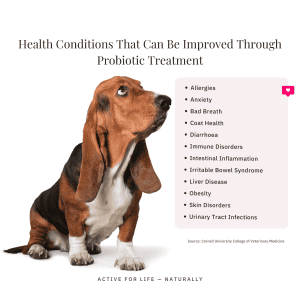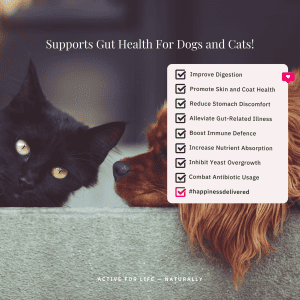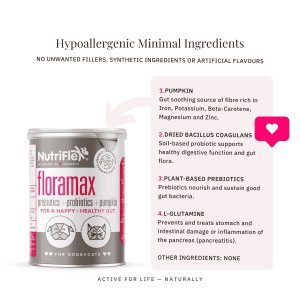At NutriFlex, we’re dedicated to improving the health and well-being of dogs. One of the areas we’ve focused on is the role of probiotics and prebiotics in canine nutrition.
This article delves into the science of these essential dietary components, their benefits, and how to effectively incorporate dog probiotics into your pet’s diet.

The Science Behind Probiotics and Prebiotics
Probiotics: The Beneficial Bacteria
Probiotics are live microorganisms, mainly bacteria and yeasts, which confer a health benefit on the host when administered in adequate amounts. They are often called ‘good’ or ‘friendly’ bacteria because they help keep the gut healthy.
Prebiotics: Food for the Good Bacteria
Prebiotics, on the other hand, are types of dietary fibre that feed the friendly bacteria in the gut. They act as a fertiliser to promote the growth of healthy bacteria, enhancing the effectiveness of probiotics.
Probiotics and prebiotics are two essential components of the gut microbiome that work synergistically to promote gut health.
Probiotics are live beneficial bacteria that are naturally created by the process of fermentation in foods like yoghurt, sauerkraut, and kimchi.
At the same time, prebiotics are types of dietary fibre that feed these beneficial bacteria.
The Difference Between Probiotics and Prebiotics for Dogs
Despite their similar names, probiotics and prebiotics perform different but complementary roles in a dog’s body.
Role of Probiotics for Dogs
Probiotics primarily maintain your dog’s gut health by:
- Balancing Gut Bacteria: They restore the natural balance of bacteria in your pet’s gut, especially after a course of antibiotics that can kill many ‘good’ bacteria.
- Promoting Nutrient Absorption: They help break down food substances, thus improving your pet’s digestion and nutrient absorption.
Role of Prebiotics for Dogs
Prebiotics work indirectly to improve your dog’s gut health by:
- Feeding Good Bacteria: They stimulate the growth and activity of beneficial bacteria in the colon.
- Supporting a Healthy Immune System: They help to enhance the immune system by promoting a healthy gut environment.
Prebiotics Play A Crucial Role In The Survival And Functionality Of Probiotics For Several Reasons:
Nutritional Support:
Prebiotics serve as the primary source of nutrition for probiotics. The beneficial bacteria in your dog’s gut thrive on dietary fibres that pets cannot digest.
These indigestible fibres, which include inulin, oligofructose, and galactooligosaccharides, are fermented by the probiotics into short-chain fatty acids such as acetate, propionate, and butyrate.
These fatty acids are crucial for the survival and multiplication of probiotics and confer several health benefits, including improved gut health, enhanced immune function, and reduced risk of certain diseases.
Competitive Advantage:
By providing a direct source of nutrition to probiotics, prebiotics helps them outcompete harmful bacteria for resources.
When probiotics thrive, they can effectively inhibit the growth of harmful bacteria by reducing the pH of the gut through the production of lactic acid, creating an environment less favourable for pathogenic bacteria.
Stimulating Growth and Activity:
Prebiotics don’t just feed probiotics; they stimulate their growth and activity.
Research has shown that the consumption of prebiotics can increase the number of probiotic bacteria in the gut, including species of Lactobacillus and Bifidobacterium.
By stimulating their growth, prebiotics helps maintain a healthy balance of gut bacteria, which is crucial for overall health.
Strengthening Intestinal Barrier:
Prebiotics help probiotics strengthen the gut barrier function, a critical part of the immune system.
The short-chain fatty acids produced by the fermentation of prebiotics by probiotics can help improve the integrity of the intestinal lining, preventing harmful substances from leaking into the bloodstream-a condition often referred to as “leaky gut.”
Promoting General Health:
Through the support of probiotics, prebiotics play a vital role in promoting general health. They contribute to better digestion, improved nutrient absorption, enhanced immune function, and reduced inflammation.
The symbiotic relationship between prebiotics and probiotics is essential for your pet’s gut health and overall wellness.
Prebiotics provide the necessary nourishment and stimulation for probiotics, which in turn, contribute to a balanced gut microbiome and overall health.
Therefore, a diet rich in prebiotics and probiotics is highly recommended for dogs.

The Benefits of Probiotics and Prebiotics for Dogs
Adding probiotics and prebiotics (synbiotics) to your dog’s diet has numerous health benefits.
Benefits of Probiotics for Dogs
- Improved Digestive Health: Probiotics for dogs can help manage diarrhoea and other gastrointestinal issues by restoring gut balance.
- Enhanced Immune System: Probiotics for dogs promote a healthy immune response, which can help combat various diseases.
- Better Skin and Coat Health: Probiotics for dogs can help alleviate skin conditions and promote a healthier coat in dogs.
Benefits of Prebiotics for Dogs
- Improved Gastrointestinal Health: Prebiotics can aid in managing certain digestive disorders by promoting a healthy gut environment.
- Enhanced Immunity: They support a robust immune system by fostering a healthy balance of gut bacteria.
- Weight Management: Prebiotics can help manage weight by promoting feelings of fullness and improving digestion.

When Should You Use Probiotics and Prebiotics?
The intricate world within your dog’s gut is a delicate balance of microscopic life forms, each playing a pivotal role in your pet’s overall well-being.
It’s a silent symphony that requires constant tuning to ensure harmony.
When your dog battles gastroenteritis, it’s equivalent to a seismic disturbance that disrupts this symphony, leaving the gut flora in disarray.
A robust reinforcement of beneficial bacteria becomes necessary, helping restore rhythm and balance.
Common toilet irregularities, such as diarrhoea or constipation, might appear trivial, but they indicate disharmony in this bacterial orchestra.
These are your dog’s subtle cues suggesting it needs an enriched repertoire of probiotics and prebiotics in its diet.
The result? A melodious gut symphony reflected in your dog’s regular and healthy stool consistency.
Antibiotics, while indispensable in combating infection, are akin to an ill-timed cymbal crash.
They eliminate all bacteria indiscriminately, disrupting the melody. In the aftermath of antibiotic treatment, supplementing your dog’s diet with pre and probiotics helps reassemble the orchestra, ensuring your four-legged friend bounces back to its energetic self swiftly.
The influence of this gut symphony extends beyond digestion.
It plays a significant role in managing non-digestive issues, such as itchy skin, allergies, yeast infections, and even stress.
Enriching your dog’s gut with probiotics and prebiotics can tune these conditions, significantly improving your dog’s quality of life.
An increased incidence of flatulence in your dog could be the gut orchestra hitting a sour note, signalling a disturbance that warrants attention.
And if you find yourself increasingly attributing unpleasant odours to your dog, perhaps it’s time to conduct your gut symphony with probiotics and prebiotics!
Incorporating Probiotics and Prebiotics into Your Dog’s Diet
Both probiotics and prebiotics can be found in certain types of food. However, consider using specially formulated dog foods or supplements such as FloraMax probiotics for dogs with prebiotics for maximum benefits.
NutriFlex FloraMax: Best Probiotic Supplement For Your Dog
Promoting peak gut health in your pet is a dance of duality – a choreography between probiotics and prebiotics.
Probiotics, the friendly bacteria, demand sustenance for flourishing, a role expertly played by prebiotics.
Acting as soluble, indigestible fibres, prebiotics fuels the probiotics, facilitating their vital work.
Regrettably, many probiotic supplements overlook this crucial partnership, compromising their efficacy and leading to your pet simply eliminating them as waste, which means you waste money on dog probiotics.
When on the hunt for a probiotic supplement for your cherished companion, be discerning.
Opt for products that don’t just promise probiotics but also assure the inclusion of prebiotics.
Consider products like NutriFlex FloraMax, designed with prebiotic-rich ingredients such as inulin (sourced from chicory root) and pumpkin fibre.
These ingredients do more than nourish and bolster the growth of beneficial gut bacteria. They amplify the efficacy of probiotics, ensuring your pet’s gut health remains at its prime.
REFERENCES
-
Staff, AKC. “Probiotics for Dogs.” American Kennel Club, American Kennel Club, 27 Aug. 2021, https://www.akc.org/expert-advice/nutrition/probiotics-for-dogs/.
-
Smith, Zachary K. “Probiotics for Animals – Pharmacology.” Merck Veterinary Manual, Merck Veterinary Manual, 18 Apr. 2022, https://www.merckvetmanual.com/pharmacology/growth-promotants-and-production-enhancers/probiotics-for-animals.
-
“The Power of Probiotics.” Cornell University College of Veterinary Medicine, 25 Feb. 2022, https://www.vet.cornell.edu/departments-centers-and-institutes/canine-health-center/health-info/power-probiotics.
